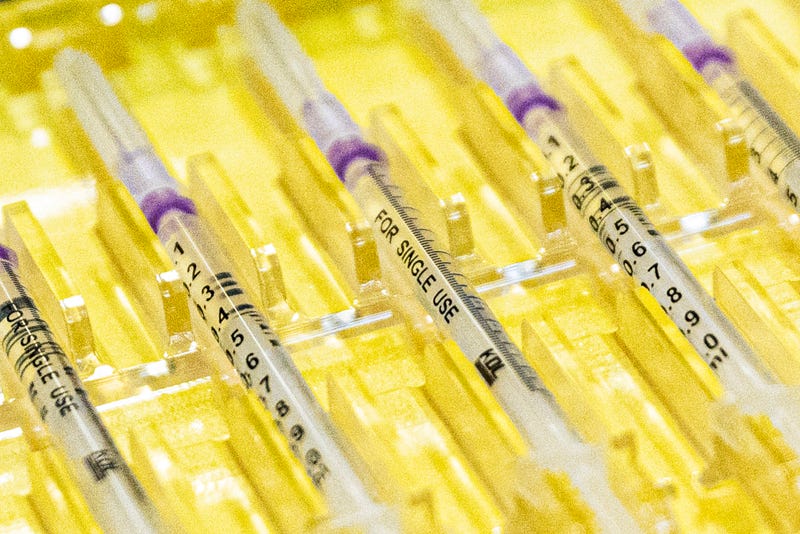
SAN FRANCISCO (KCBS RADIO) – Following a U.S. Food and Drug Administration advisory committee recommending an emergency use authorization for the two-dose Novavax COVID-19 vaccine in adults, UCSF infectious disease expert Dr. Peter Chin-Hong is optimistic the immunization can make inroads with vaccine holdouts.
For more, stream KCBS Radio now.
"I think what people are going to see is just different kinds of vaccines to meet people in different places and where they are," Dr. Chin-Hong, a professor of medicine at UCSF, told KCBS Radio's "Ask An Expert" on Friday morning.
The FDA first issued emergency use authorizations for three mRNA vaccines more than a year ago, and 76.7% of Americans had completed their initial vaccination series as of Friday morning, according to the U.S. Centers for Disease Control and Prevention.
Yet the U.S. had administered just 290,000 doses per day over the week ending on June 8, per the agency's data, down significantly from the 1.2 million the country averaged at the same juncture last year.
Dr. Chin-Hong said he was hopeful that the Novavax's usage of "old-fashioned" protein subunit technology – similar to influenza and hepatitis B immunizations – could provide some solace to unvaccinated people "who are worried about the mRNA technology."
"It kind of just chops up the proteins, ready-made, presents it to the body and you make antibodies, instead of sending a genetic code, which is what the mRNA vaccines do," he said, noting the differences between the two technologies.
A peer-reviewed study published late last month in the journal Communications Medicine found that the novelty of mRNA vaccines can increase vaccine hesitancy, although social conformity can reduce it.
Misinformation and disinformation about the nature of the mRNA technology has spread since the vaccines became widely available, but some FDA committee members were skeptical that Novavax’s vaccine would sway unvaccinated Americans.
"Their hesitancy is more ideological than technological," Children's Mercy Hospital immunologist and allergist Jay Portnoy said during Tuesday's meeting.
Seventeen percent of Americans polled in April by the Kaiser Family Foundation said they would "definitely not" take the COVID-19 vaccine. That was up from 13% of respondents at the same time last year. Thirty-seven percent of Republicans polled said they would definitely not, up from 20% in April 2021.
Whether or not the Novavax vaccine sways the unvaccinated, Dr. Chin-Hong said its availability will still benefit the American public. Once it’s approved, it won’t take long for unvaccinated people to get shots in their arms.
"Novavax is already approved and being used in 41 countries around the world, so it's not a matter of having the supply," he said. "It's just a matter of will. There's probably less urgency for Novavax to be sort of like jumping on the market because there's so many vaccines available, but the factory's ready and poised to supply these as soon as there’s FDA approval."
DOWNLOAD the Audacy App
SIGN UP and follow KCBS Radio
Facebook | Twitter | Instagram

